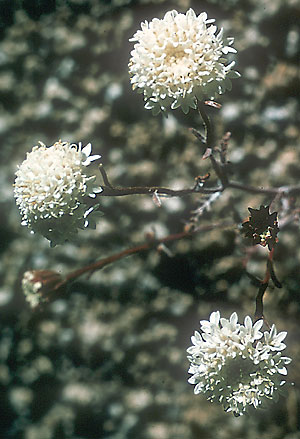Mojave pincushion facts for kids
Quick facts for kids Chaenactis xantiana |
|
|---|---|
 |
|
| Scientific classification | |
| Kingdom: | |
| (unranked): | |
| (unranked): | |
| (unranked): | |
| Order: | |
| Family: | |
| Tribe: | |
| Genus: | |
| Species: |
C. xantiana
|
| Binomial name | |
| Chaenactis xantiana |
|
| Synonyms | |
|
Chaenactis floribunda Greene |
|
Chaenactis xantiana, also known as the Mojave pincushion or Xantus pincushion, is a type of flowering plant. It belongs to the Asteraceae family, which includes sunflowers and daisies. This plant grows naturally in the western United States. You can find it in places like southeastern Oregon, Nevada, southern and eastern California, and northwestern Arizona. It's very common in the Antelope Valley area of the Mojave Desert, especially in sandy soils.
Contents
What Does the Mojave Pincushion Look Like?
The Mojave pincushion is an annual plant. This means it completes its entire life cycle (from seed to flower to seed) within one year. It can grow up to 50 centimeters (about 20 inches) tall.
Leaves and Stems
The leaves of this plant are a bit succulent. This means they are thick and can store water, which helps the plant survive in dry places. The leaves are usually 3 to 7 centimeters long and 3 to 4 millimeters wide.
When the plant is young, its leaves form a rosette close to the ground. As the plant grows and starts to flower, these bottom leaves often dry up. New leaves grow in a spiral pattern along the flowering stem. They are green but have tiny white scales, which give the plant a grayish look.
Flowers and Blooms
The Mojave pincushion produces white flowers. These flowers grow in a cluster called a capitulum, which is like a head of flowers. Each capitulum is usually 3 to 6 centimeters across.
Similar Plants
This plant looks a lot like another species called Chaenactis stevioides, also known as the Esteve pincushion. They can sometimes be hard to tell apart!
How It Got Its Name
The scientific name Chaenactis xantiana honors a Hungarian-American scientist named John Xantus. He was an ichthyologist, which means he studied fish. He lived from 1825 to 1894.

